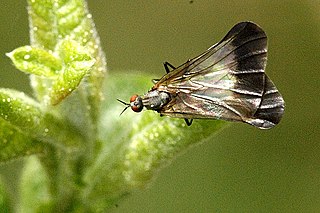
Empididae is a family of flies with over 3,000 described species occurring worldwide in all the biogeographic realms but the majority are found in the Holarctic. They are mainly predatory flies like most of their relatives in the Empidoidea, and exhibit a wide range of forms but are generally small to medium-sized, non-metallic and rather bristly.

Rhamphomyia is a genus of dance flies, in the fly family Empididae.

Rhamphomyia sulcata is a species of dance flies, in the fly family Empididae. It is included in the subgenus Rhamphomyia. It is found in most of Europe, except the Balkan Peninsula.

Rhamphomyia lamellata is a species of dance flies, in the fly family Empididae. It is included in the subgenus Holoclera of the genus Rhamphomyia. It is found in Great Britain and Ireland, Germany, Switzerland, the Czech Republic, Slovakia and Hungary.

Rhamphomyia pilifer is a species of dance flies, in the fly family Empididae. It is found in most of Europe, except the Balkan Peninsula and the Iberian Peninsula.

Rhamphomyia albohirta is a species of fly in the family Empididae. It is included in the subgenus Aclonempis. It is found in the Palearctic.

Rhamphomyia hirsutipes is a species of fly in the family Empididae. It is include in the subgenus Amydroneura of the genus Rhamphomyia. It is found in the Palearctic.
Rhamphomyia subcinarescens is a species of dance flies, in the fly family Empididae. It is included in the subgenus Rhamphomyia.
Rhamphomyia sulcatella is a species of dance flies, in the fly family Empididae. It is included in the subgenus Rhamphomyia.
Rhamphomyia sulcatina is a species of dance flies, in the fly family Empididae. It is included in the subgenus Rhamphomyia.
Rhamphomyia caliginosa is a species of dance flies, in the fly family Empididae. It is included in the subgenus Holoclera of the genus Rhamphomyia.
Rhamphomyia morenae is a species of dance flies, in the fly family Empididae. It is included in the subgenus Holoclera of the genus Rhamphomyia.
Rhamphomyia anthracina is a species of dance flies, in the fly family Empididae. It is included in the subgenus Rhamphomyia.
Rhamphomyia tibialis is a species of dance flies, in the fly family Empididae. It is included in the subgenus Rhamphomyia.
Rhamphomyia crassicauda is a species of dance flies, in the fly family Empididae. It is include in the subgenus Amydroneura of the genus Rhamphomyia.
Rhamphomyia mariobezzii is a species of dance flies, in the fly family Empididae. It is included in the subgenus Aclonempis.
Rhamphomyia minor is a species of dance flies, in the fly family Empididae. It is included in the subgenus Aclonempis.
Rhamphomyia claripennis is a species of dance flies, in the fly family Empididae. It is include in the subgenus Amydroneura of the genus Rhamphomyia.
Rhamphomyia pseudogibba is a species of dance flies, in the fly family Empididae. It is include in the subgenus Amydroneura of the genus Rhamphomyia.
Rhamphomyia bipila is a species of dance flies, in the fly family Empididae. It is include in the subgenus Amydroneura of the genus Rhamphomyia.






